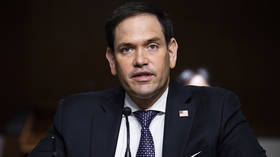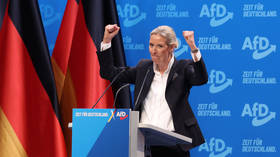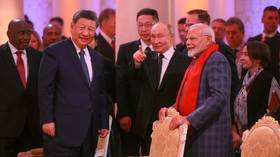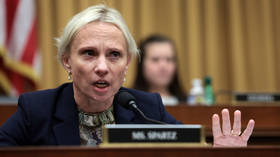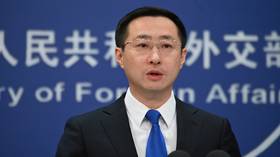The real motivation for Turkey’s Libya power play is not prestige... It’s natural gas
Recep Tayyip Erdogan’s decision to intervene in Libya on behalf of the Government of National Accord (GNA) is more than self-aggrandizement — it’s about control of the development of energy resources in the eastern Mediterranean.
Erdogan steps in to save GNA
The passage of legislation by the Turkish Parliament on Thursday authorizing the deployment of Turkish military forces to Libya puts teeth to the agreements signed in late November 2019 between President Erdogan and the head of the GNA, Fayez Al-Sarraj, establishing a maritime border and laying out a security framework between the two nations.
Also on rt.com Turkish parliament backs govt plan to send troops to Libya in emergency sessionThe GNA, formed in the aftermath of the US-led NATO intervention in Libya in 2011 that ousted the long-time ruler of Libya, Muammar Ghaddafi, has been under attack by rebel forces belonging to the Libyan National Army (LNA), led by Khalifa Haftar, a former general in Ghaddafi’s army. The agreements signed between Turkey and the GNA come on the heels of Haftar’s promise to launch a “final offensive” against the GNA capitol of Tripoli. The promise of Turkish military support to the GNA, which is viewed by the United Nations as the legitimate government of Libya, is seen as a last-ditch effort to stave off Haftar’s forces, which are backed by Egypt, the UAE and Russia.
The energy bounty of the Eastern Mediterranean
While much attention has been paid to the possibility of Turkish boots on the ground in Libya, and the ramifications such a development would have on the GNA-LNA power struggle, the real story here isn’t the fact that Turkey has opted to intervene so decisively on behalf of the GNA, but why such a precipitous decision was made to begin with.
For the past decade, the eastern Mediterranean Sea has witnessed a flurry of exploration which has identified sizeable deposits of gas suitable for development.
As a result, the demarcation of the waters of the eastern Mediterranean has taken on enormous economic geo-political importance, leading to a series of agreements between Cyprus, Israel, Egypt and Greece concerning the establishment of exclusive economic zones (EEZ) spelling out who gets what in terms of development and exploitation rights.
Ankara redraws borders to block rival pipeline
Turkey, which has a long-standing dispute with Cyprus and Greece over the status of the so-called Turkish Republic of Northern Cyprus (TRNC), created in the aftermath of the Turkish invasion of Cyprus in 1974, has used the existence of the TRNC to challenge the legitimacy of the EEZ demarcation in and around Cyprus. Turkey’s concerns, however, have been largely ignored by the other nations involved in carving up the potential energy wealth of the eastern Mediterranean Sea. Indeed, just this past week Greece, Cyprus and Israel signed an agreement to build a 1,300-kilometer pipeline that would supply Europe with gas produced from
the eastern Mediterranean. This pipeline, known as the EastMed, has the support of the European Union (EU), and is seen as a direct challenge to the recently completed Turk Stream pipeline, which transits Russian gas through the Black Sea and into Turkey for delivery to southern Europe.
Also on rt.com Erdogan announces Turkey-Russia gas pipeline TurkStream will be launched on January 8There is one major catch to the EastMed pipeline project—Turkey’s newly established maritime border with Libya. The agreement establishing the maritime border effectively nullifies the EEZ demarcation between Greece and Cyprus and, in doing so, effectively blocks the EastMed pipeline. Turkey’s move has been condemned by the parties to the EastMed pipeline and the EU and will be challenged in court. The litigation surrounding this dispute could take years to be resolved. It has also been rejected by General Haftar and his sponsors in Egypt, who reject the GNA’s legitimacy and authority to strike such a deal with Turkey. This is where the Turkish security guarantees to the GNA come in.
If Haftar’s LNA were able to successfully drive the GNA from Tripoli, that would effectively end the GNA as a governing authority, and in doing so nullify any agreements it undertook, including the establishment of the Libyan-Turkish maritime border. Turkey’s promise of military intervention is far more than a simple lifeline to the GNA; it represents the linchpin to Turkey’s larger objectives in the eastern Mediterranean sea and, by extension, the viability of its long-term status as an energy hub for southern Europe vis-à-vis the Turk Stream pipeline.
Will the other players counter?
The Turkish move in Libya has the potential of further destabilizing an already unstable situation in Libya. Most observers agree that the legislation authorizing the deployment of Turkish forces into Libya is more deterrence than reality. The prospects of sizable contingents of Turkish troops appearing on Libyan soil anytime soon are slim, with Ankara relying upon military advisors and proxy fighters from Syria, backed up with arms and intelligence support, to bolster the GNA.
Also on rt.com Imperial delusion: Turkey sending troops to Libya would be no solution to the chaos caused by the 2011 NATO interventionThis could change, however, if Haftar was to seek additional support from Egypt, the UAE, and even Russia to offset the Turkish assistance. Left unspoken in all of this is how this situation devolved to the point it has—namely the US-led NATO intervention in 2011 that removed Muammar Ghaddafi from power. The power vacuum Ghaddafi’s demise created has led to the breakdown of authority in Libya, manifested in the current Civil War between the GNA and LNA. All sides have taken advantage of this chaos for their own benefit. While the final chapter of the Libyan tragedy has yet to be written, as things currently stand it is advantage Turkey. How long this advantage can be sustained, before the other players make their next move?
If you like this story, share it with a friend!
The statements, views and opinions expressed in this column are solely those of the author and do not necessarily represent those of RT.







